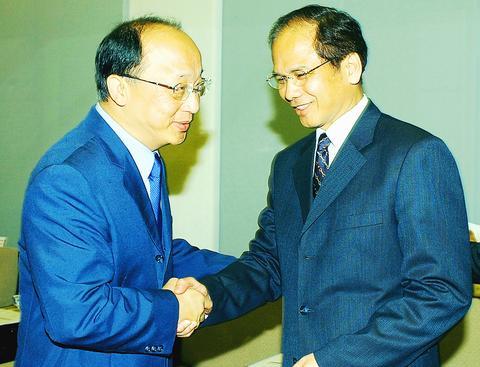Premier Yu Shyi-kun yesterday agreed to grant Taichung City NT$3.2 billion toward its planned establishment of a NT$6.4 billion branch of the Guggenheim Museum and will decide within three weeks whether to grant the city NT$2 billion more.
"We don't have any problem with funding the city half of the construction cost since it's a pledge made by President Chen Shui-bian (陳水扁)," Cabinet Secretary-General Liu Shih-fang (劉世芳) quoted Yu as saying.

PHOTO: CNA
"But we have to make sure that we can afford the additional request of NT$2 billion and that the additional funding won't create any backlash from neighboring counties and cities," Liu quoted Yu as saying.
Yu made the remarks yesterday morning while receiving Taichung Mayor Jason Hu (
Hu's visit comes one week after his meeting with Chen, who pledged that the central government would shoulder half of the museum's construction expenses.
Painting Yu's decision as "acceptable," Hu took the opportunity yesterday to shrug off media speculation that his visit was politically motivated.
He stressed that his visit was aimed at boosting the interest of his city and that of central Taiwan.
"I feel like the most expensive gigolo in town with a NT$5 billion price tag placed on my forehead, as many have interpreted my visit today as a political gambit for my personal gain," Hu said.
As a KMT member, Hu said there is no doubt that he has his own political agenda but it is inappropriate for the media to mix it up with his capacity as Taichung mayor.
"As mayor, my job is to do my best to fight for the best interests of my city and this shouldn't be mistaken for the interests of my party," he said.
The recent friendly interactions between the DPP administration and local KMT chiefs have caught media attention. Hu is part of what the media calls "Ma-Li-Chiang" (high horsepower, 馬立強) to describe the three popular KMT government chiefs deemed to have promising political careers.
The three characters are taken from the names of Taipei Mayor Ma Ying-jeou (
To fund the additional NT$2 billion, Liu said the Cabinet may include the project in its three-year, NT$300 billion public-construction project or the five-year, NT$500 billion public-construction project -- if the city gets the museum.
"The bottom line is, however, that the additional funds don't overlap with other cultural re-sources or result in disparity of cultural resources allocated in northern, central and southern Taiwan," Liu said.
The Solomon Guggenheim Foundation is studying the feasibility of the planned museum. If it agrees, Taichung will become the first city in the Asia-Pacific region to have a Guggenheim subsidiary.
The Guggenheim has branches in Venice, Berlin, Bilbao, Las Vegas and New York.
Like the Bilbao facility, the Guggenheim Taichung would exhibit a significant amount of contemporary Asian art, including that of Taiwan.

Trips for more than 100,000 international and domestic air travelers could be disrupted as China launches a military exercise around Taiwan today, Taiwan’s Civil Aviation Administration (CAA) said yesterday. The exercise could affect nearly 900 flights scheduled to enter the Taipei Flight Information Region (FIR) during the exercise window, it added. A notice issued by the Chinese Civil Aviation Administration showed there would be seven temporary zones around the Taiwan Strait which would be used for live-fire exercises, lasting from 8am to 6pm today. All aircraft are prohibited from entering during exercise, it says. Taipei FIR has 14 international air routes and

Taiwan lacks effective and cost-efficient armaments to intercept rockets, making the planned “T-Dome” interception system necessary, two experts said on Tuesday. The concerns were raised after China’s military fired two waves of rockets during live-fire drills around Taiwan on Tuesday, part of two-day exercises code-named “Justice Mission 2025.” The first wave involved 17 rockets launched at 9am from Pingtan in China’s Fujian Province, according to Lieutenant General Hsieh Jih-sheng (謝日升) of the Office of the Deputy Chief of the General Staff for Intelligence at the Ministry of National Defense. Those rockets landed 70 nautical miles (129.6km) northeast of Keelung without flying over Taiwan,

City buses in Taipei and New Taipei City, as well as the Taipei MRT, would on Saturday begin accepting QR code payments from five electronic payment providers, the Taipei Department of Transportation said yesterday. The new option would allow passengers to use the “transportation QR code” feature from EasyWallet, iPass Money, iCash Pay, Jkopay or PXPay Plus. Passengers should open their preferred electronic payment app, select the “transportation code” — not the regular payment code — unlock it, and scan the code at ticket readers or gates, General Planning Division Director-General Liu Kuo-chu (劉國著) said. People should move through the

The Ministry of National Defense (MND) today released images of the military tracking China’s People's Liberation Army (PLA) movements during the latest round of Chinese drills around Taiwan. The PLA began "Justice Mission 2025" drills today, carrying out live-fire drills, simulated strikes on land and maritime targets, and exercises to blockade the nation's main ports. The exercises are to continue tomorrow, with the PLA announcing sea and air space restrictions for five zones around Taiwan for 10 hours starting from 8:30am. The ministry today released images showing a Chinese J-16 fighter jet tracked by a F-16V Block 20 jet and the